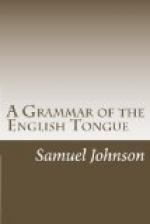3. Take, shake, forsake, wake, awake, stand, break, speak, bear, shear, swear, tear, wear, weave, cleave, strive, thrive, drive, shine, rise, arise, smite, write, bide, abide, ride, choose, chuse, tread, get, beget, forget, seethe, make in both preterit and participle took, shook, forsook, woke, awoke, stood, broke, spoke, bore, shore, swore, tore, wore, wove, clove, strove, throve, drove, shone, rose, arose, smote, wrote, bode, abode, rode, chose, trode, got, begot, forgot, sod. But we say likewise, thrive, rise, smit, writ, abid, rid. In the preterit some are likewise formed by a, as brake, spake, bare, share, sware, tare, ware, clave, gat, begat, forgat, and perhaps some others, but more rarely. In the participle passive many of them are formed by en, as taken, shaken, forsaken, broken, spoken, born, shorn, sworn, torn, worn, woven, cloven, thriven, driven, risen, smitten, ridden, chosen, trodden, gotten, begotten, forgotten, sodden. And many do likewise retain the analogy in both, as waked, awaked, sheared, weaved, cleaved, abided, seethed.
4. Give, bid, sit, make in the preterit gave, bade, sate; in the participle passive given, bidden, sitten; but in both bid.
5. Draw, know, grow, throw, blow, crow like a cock, fly, slay, see, ly, make their preterit drew, knew, grew, threw, blew, crew, flew, slew, saw, lay; their participles passive by n, drawn, known, grown, thrown, blown, flown, slain, seen, lien, lain. Yet from flee is made fled; from go, went, (from the old wend) the participle is gone.
* * * * *
Of derivation.
That the English language may be more easily understood, it is necessary to inquire how its derivative words are deduced from their primitives, and how the primitives are borrowed from other languages. In this inquiry I shall sometimes copy Dr. Wallis, and sometimes endeavour to supply his detects, and rectify his errours.
Nouns are derived from verbs.
The thing implied in the verb, as done or produced, is commonly either the present of the verb; as to love, love; to fright, a fright; to fight, a fight; or the preterit of the verb, as to strike, I strick or strook, a stroke.
The action is the same with the participle present, as loving, frighting, fighting, striking.
The agent, or person acting, is denoted by the syllable er added to the verb, as lover, frighter, striker.
Substantives, adjectives, and sometimes other parts of speech, are changed into verbs: in which case the vowel is often lengthened, or the consonant softened; as, a house, to house; brass, to braze; glass, to glaze; grass, to graze; price, to prize; breath, to breathe; a fish, to fish; oil, to oil; further, to further; forward, to forward; hinder, to hinder.
Sometimes the termination en is added, especially to adjectives; as, haste, to hasten; length, to lengthen; strength, to strengthen; short, to shorten; fast, to fasten; white, to whiten; black, to blacken; hard, to harden; soft, to soften.




